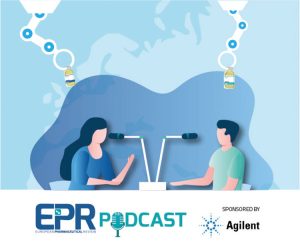European Pharmaceutical Review podcast

EPR Podcast Episode 13 – QC spectroscopy compliance – Garry Wright and Julia Griffen, Agilent

While we all know regulatory compliance is crucial, it can be challenging to meet the expectations within the highly regulated pharmaceutical industry. With spectroscopy instruments being a crucial pharmaceutical analysis tool, and their applications across the pharma industry growing, in this episode Agilent Technologies’ Julia Griffen, Product Manager Raman Products and Garry Wright, European Laboratory Compliance Specialist, highlight some of the common compliance issues companies are facing when leveraging spectroscopy for QC and what to do to overcome them.
What kinds of compliance issues, especially with spectroscopy instruments, are companies struggling with in the QC lab?
Garry explains that in the QC lab, “some of the most common compliance concerns that we see regulated companies facing are things like gaps in their documentation, incomplete investigations, sometimes they struggle to have the skills or expertise to train their staff. Other challenges include struggling to configure and validate their software correctly and implementing data integrity controls.”

Julia Griffen, Product Manager Raman Products
“A lot of the compliance issues we see today with spectroscopy instruments are not specific to the particular instrument platform or software – they are more around the controls needed to minimise compliance and data integrity risk. These need to be implemented consistently across the complete laboratory, regardless of the instrument or software being used,” he adds. One particular issue he highlights is that chromatography tends to be prioritised, as these instruments contributes a lot of good manufacturing practice (GMP) data, where companies tend to give spectroscopy instruments lower priority and, due to a lack of time or resources, do not implement the same level of control working with controls that still present a compliance risk.
“The regulatory requirements for spectroscopy instruments are exactly the same as chromatography instruments… so if you are going to implement technical controls within spectroscopy software, make sure they are applied at the same level as for your chromatography systems,” he asserts. Julia also highlights that she has experienced a knowledge gap when it comes to implementing spectroscopy versus chromatography: “this is an issue that needs to be addressed to ensure compliance – education of the requirements to implement spectroscopy in a compliant manner.”
What impact does a lack of compliance have on companies?

Garry Wright, European Laboratory Compliance Specialist
“Receiving a non-conformance citation can have a significant impact on the future success of your company because, particularly warning letters, are published in the public domain by regulators all over the world. That makes that warning letter readily available to your existing customers, to potential future customers, but also to your competitors,” explains Garry, adding: “I do not think people realise the impact that a warning letter or non-conformance can have on the future of your business because it is clearly visible and can affect existing and future business.”
What are the top five considerations for ensuring compliance with spectroscopy/QC instruments?
Garry highlights five key parameters to focus on:
- how the instrument is used – because companies use instruments differently, the intended use must be defined and this should dictate many aspects, including how the instrument is qualified and how the software is configured and validated
- instrument qualification – qualification should be dictated by how you intend to use the instrument, so your user requirements have been tested to ensure that in practice it is used within the qualified range
- software validation – there are many configurable options and companies will have different requirements for different workflows, “it is really important that you choose the right configuration for your workflow” and this needs to be tested during the software validation phase
- implementing data integrity controls – “although data integrity is not a new topic for industry, we still see a lot of non-conformance coming through for companies who have not configured their software correctly and have not built in the appropriate data integrity controls”
- moving towards fully digital systems – paper based and hybrid systems can be difficult to manage, “so if you are investing in new software platforms, try and go digital from day one – make sure you perform the full workflow within the software, that is all of the data acquisition, the data processing, the data reporting and all the review and approvals at the end without printing out any data”.
To find out why learning from warning letters about compliance failures is critical, how digitalisation and automation are impacting QC lab compliance and so much more, tune in to the episode!
Please join the conversation and leave your thoughts in the comments – we love hearing your feedback – and look out for our next episode coming soon!
The post <em>EPR</em> Podcast Episode 13 – QC spectroscopy compliance – Garry Wright and Julia Griffen, Agilent appeared first on European Pharmaceutical Review.






 Visit Podcast Website
Visit Podcast Website RSS Podcast Feed
RSS Podcast Feed Subscribe
Subscribe
 Add to MyCast
Add to MyCast